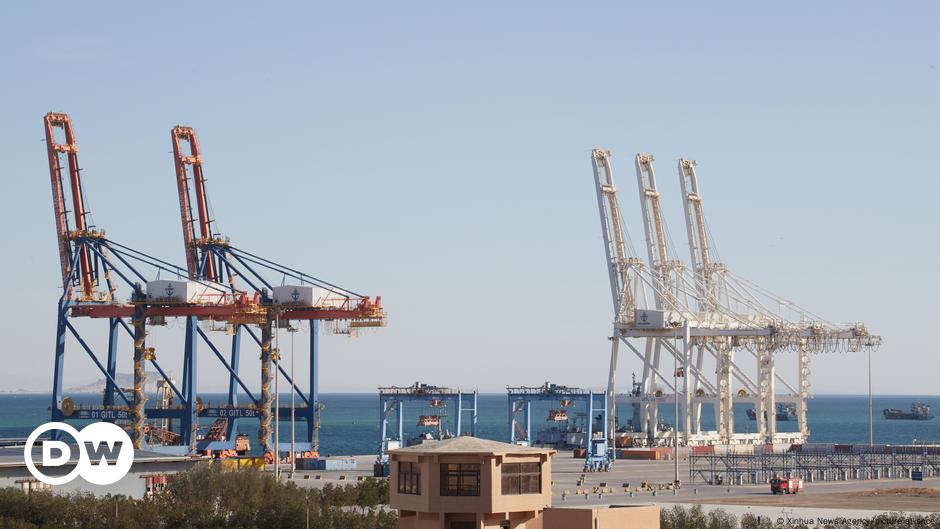As Pakistan works on enacting economic reforms under a new multibillion-dollar IMF bailout, Islamabad must first figure out what to do with its mountain of debt owed to China.
After cash-strapped Pakistan secured a new $7 billion (€6.5 billion) bailout package from the International Monetary Fund (IMF) in July, Islamabad has started talks with Beijing on reprofiling billions in Chinese debt as it seeks to enact economic reforms.
On the table are proposals to delay at least $16 billion in energy sector debt to China, along with extending the term of a $4 billion cash loan facility due to depleting foreign exchange reserves.
…
Analysts say that the CPEC loans were initially presented as the cheapest option for international loans, but it later emerged that they would be far more expensive to pay back than expected.
“The agreements, heavily favoring China, were poorly negotiated, resulting in the project being over-promised and under-delivered. The public and media were misled by the then minister of planning and his team to portray CPEC as a significant economic game-changer for Pakistan and the region,” Khalid said.
It’s the whole point of China’s belt and Road initiative. To trap others in debt one way or another. Temporarily propping up their economy. But still leaving them with leverage when it fails.
Are you sure this is actually the goal?
Aid to developing countries from the west does not have a very good track record either.
Obviously if China can build the economies of those countries, it would benefit China in the long run, while controlling an economy that runs at a deficit is not that attractive.
You may be right, but I’m just not sure it really makes as much sense as many people seem to believe.Are you sure this is actually the goal? Aid to developing countries from the west does not have a very good track record either.
Yes, there’s ample evidence of it. Actually aid wise the US has been rather decent. The Marshal plan etc has a pretty good track record. That said the US absolutely does meddle too much in the governance of many countries. Though generally those countries don’t get much aid to speak of. Either way it doesn’t matter. I never mentioned the United states. Even if the United States was worse at it. That doesn’t make China doing it right.
Obviously if China can build the economies of those countries, it would benefit China in the long run, while controlling an economy that runs at a deficit is not that attractive.
That specifically isn’t what China is doing. If they were pulling from the local populace, hiring people to hekp with the building and construction. That would be one thing. What they’re doing is using this to prop up their own economy. Bringing along Chinese workers. Building this for the countries and charging them for it. They will get to use it some. But more than anything it’s used to expand the Chinese economy. Not build other local economies. Outside of consumerism that is.
Controlling economies that operate at a deficit is very desirable for china. They want the resources located in many of these countries. What better way to get it than to have an in or to control the local government? If it didn’t make sense, the United States wouldn’t be trying to feel similar functions through different methods. It’s a form of soft power which is usually some of the best power. You don’t have to send people to war and kill people to get things done. It’s why corporations try to trap people in debt as well.
I mean, the IMF doing debt traps for 80 years is kind of the main defining feature of neo-colonialism.
China’s BnR initiative is just a competing form of it.
Both of these things can simultaneously be bad.
The easy answer :
- Bad money management
- Corruption
- Dumb government
- Low GDP
- People doesn’t care whatever the government doing
But I was assured by tankies that China was just giving countries money and not expecting payback. Were they lying? /s
Why would Pakistan pay? America is billions of dollars in debt, and has never once made an attempt to actually pay its debts.
China would have to invade Pakistan, and that would lead to a whole shitstorm of other nations getting involved.
So why even attempt to pay?
America is billions of dollars in debt, and has never once made an attempt to actually pay its debts.
This is false, USA is always paying debt in full and on time, which is why it can continue to borrow cheap.
What you are probably thinking of, is that USA should stop taking on new debt. But since they don’t have to stop, why should they?
The huge difference between USA and a struggling economy like Pakistan, is that Pakistan risk they can’t take on new debt, or if they can, it’s very expensive. Not being able to borrow what they need to run the economy, will cause a major slowdown of the economy, or said in terms that focus more on human consequences, it will cause vastly increased poverty in Pakistan, because any crisis always hit the poor the hardest.The two are in no way comparable.
deleted by creator
DW News - News Source Context (Click to view Full Report)
Information for DW News:
MBFC: Left-Center - Credibility: High - Factual Reporting: High - Germany
Wikipedia about this source




